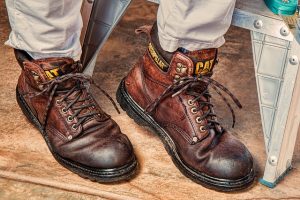 Remember that Simpsons episode where Homer was trying to get on worker’s comp so that he could stay at home and collect a free check at the end of the month? Funny or not, it’s actually not the attitude most workers have. Injuries are no fun, and the “free money” you receive when staying at home and recovering from an injury can’t make up for the cabin fever and boredom that go with having nothing to do in a day. Though the public perception of an injured worker may be that they’ve won some sort of lottery, if you run construction jobs for long enough you’ll find that the opposite often turns out to be true: Many injured workers can’t wait to get back on the job, and they might be a little too eager to strap on the tool belt and get back to work.
Remember that Simpsons episode where Homer was trying to get on worker’s comp so that he could stay at home and collect a free check at the end of the month? Funny or not, it’s actually not the attitude most workers have. Injuries are no fun, and the “free money” you receive when staying at home and recovering from an injury can’t make up for the cabin fever and boredom that go with having nothing to do in a day. Though the public perception of an injured worker may be that they’ve won some sort of lottery, if you run construction jobs for long enough you’ll find that the opposite often turns out to be true: Many injured workers can’t wait to get back on the job, and they might be a little too eager to strap on the tool belt and get back to work.
Assessing whether or not a worker needs a little more time to recover before they get back on the schedule isn’t easy. You’re in construction, not medicine or physical therapy. But, there are a few things to keep in mind that may help you to make the right judgement call:
A Little Too Soon Beats A Little Too Late
Studies have shown that the longer a worker is away from the job, the harder a time they’re going to have getting back into it. With that in mind, it’s often better to let a worker return to the job site and take on lower-intensity tasks while they get back into the swing of things than it is to wait an extra week and expect them to give 110% right away.
Keep An Open Line Of Communication
Make sure your worker knows that they can come to you and let you know when they can’t lift a bag of cement just yet. There’s plenty of work that won’t agitate an injury, so let them know that it’s okay if they want to handle the lighter-duties for now.
Nobody Should Be Working Construction On Heavy Medication
They don’t just put that warning about operating heavy machinery on bottles of prescription painkillers in order to avoid lawsuits. If your worker is still experiencing pain and discomfort to such an extent that a couple over-the-counter Aspirins won’t take care of it, then they’re probably not ready to return to work.
Basically: Don’t be afraid to tell a worker to take it easy when they first come back to work. Getting back to work can help the recovery process, but not when the worker is pushing himself beyond what he can safely handle.





